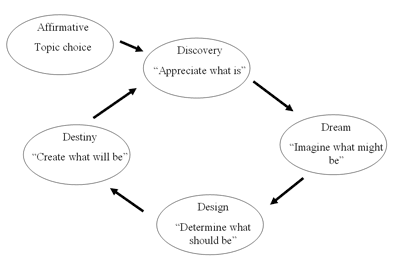|
|
|
APPRECIATIVE ENQUIRY
What is Appreciative Enquiry?
| |
AI is the study and exploration
of what gives life to human systems when they
function at their best |
| |
An approach for personal and
organizational change |
| |
Based on the assumption that
questions and dialogues about strengths,
successes, values, hopes and dreams are
themselves transformational |
| |
Human organizing and change at
its best is a relational process of inquiry,
grounded in affirmation and appreciation |
AI is founded on the following beliefs about
Human Nature and Human Organizing
| |
People individually and collectively have unique gifts,
skills and contributions to bring to life |
| |
Organizations are human social systems, sources of
unlimited relational capacity, created and lived on
language |
| |
The images we hold of the
future are socially created and once
articulated, serve to guide individual and
collective actions |
| |
Through inquiry and dialogue (communication) people can
shift their attention and action away from problem
analysis to lift up worthy ideals and productive
possibilities for the future |
The 4-D Cycle

From Deficit-Based Change to Positive Change
| |
Deficit-Based
Change |
Positive Change |
Intervention Focus
|
Identified Problem |
Affirmative Topics |
Participation
|
Selected People |
All (Whole System) |
| Action Research |
Diagnosis of
problem
Cause and effect
Quantitative analysis
Profile of need
Conducted by external experts
|
Discovery of
positive core
Organization at its best
Narrative analysis
Map of positive core
Conducted by members |
| Dissemination |
Feedback to
decision makers
|
Widespread and
creative sharing of best practices
|
| Creative Potential |
Brainstormed list
of alternatives
|
Dream of a better
world and the organization's contribution
|
| Result |
Best solution to
resolve the problem
|
Design to realize
dreams and human aspirations
|
| Capacity Gained |
Capacity to
implement and measure the plan
|
Capacity for
ongoing positive change
|
Six Reasons Why AI Works
| 1. |
Builds relationships - enabling
people to be known in relationships, rather than
in roles |
| 2. |
Creates an opportunity for
people to be heard |
| 3. |
Allows opportunities for people
to dream, and to share their dreams |
| 4. |
Creates an environment in which
people are able to choose how they contribute |
| 5. |
Gives people both discretion
and support to act |
| 6. |
Encourages and enables people
to be positive |
[ top ]
|